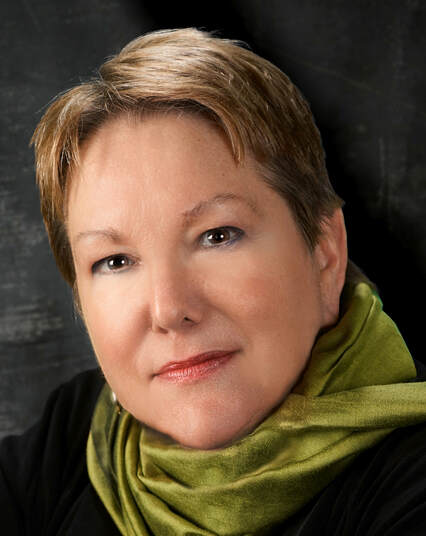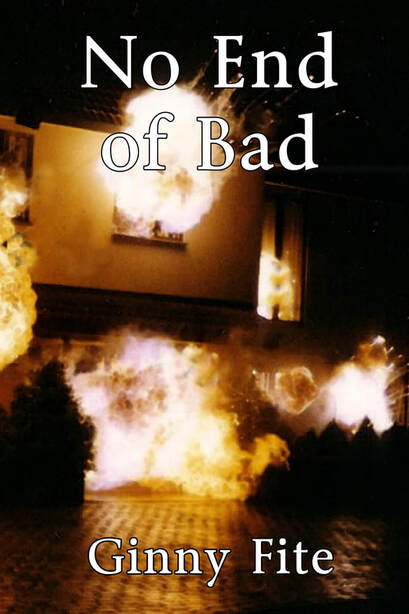 Ginny Fite is the author of the thriller No End of Bad, the dark mystery/thrillers Cromwell's Folly, No Good Deed Left Undone, and Lying, Cheating, and Occasionally Murder, a humorous book on aging, I Should Be Dead by Now, a collection of short stories, What Goes Around, and three books of poetry. An award-winning journalist, her short stories have been published in numerous literary journals. She earned her degrees at Rutgers University and Johns Hopkins University and also studied at The School for Women Healers and the Maryland Institute for Poetry Therapy. She lives in Harpers Ferry, West Virginia. Forty years ago, at a self-actualization seminar, I wrote down three life goals as part of an exercise. I only remember two of those goals: to have all my novels published and have a car that works. There was one main problem with my first goal. I hadn’t written any novels. I was a working poet at the time. A chapbook of my poetry, The Last Thousand Years, had been published as a university prize. My poems were appearing in small literary journals. I could imagine a maximum of fifty words at a time on a page. I write short poems. I like white space around words. The world of work closed around me. For 20 years as a journalist and communicator I wrote news stories, features, press releases, speeches, position papers, and hundreds and hundreds of poems. If you write, then you know that stories ping off everything you hear or see or do, every second-hand observation by a stranger, every moment standing in line listening in on someone else’s conversation, every sudden pop of an idea while you’re washing the dishes. All that time, I was gathering material. But the question of how one made fiction out of one’s own experience baffled me. As far as I could see, there was only so much I could say—like two sentences—about my life that would matter to anyone else. Where did the ideas come from that yielded a novel? A novel needs desire, anticipation, conflict and epiphanies. Even if I understood the three-act structure and how to build to a climax from studying Greek tragedies, how did I translate that to any fiction I would write? But if that little bit of magic–writing down my goal on a piece of paper decades before–has anything to teach me, it’s that something in me already knew there were novels lurking in my brain. Being a journalist taught me how to put more than fifty words on a page. The world of prose—with all its dependent clauses, its multiple lines of inquiry, as well as how editors cut from the bottom—opened to me on pages of newsprint and magazine spreads. It’s possible that if I’d become a journalist in the digital age, with its tiny screens and foreshortened stories, I would never have become a novelist. Still, going from fifty to 800 or even 2,000 words was not as huge a leap as going from there to 70,000 words. I needed another stepping stone. I wrote essays and short stories. Little by little, I wrote a novel—the typical semi-autobiographical work of a novice writer—and rewrote it and rewrote it, and then sent it out to agents and got lovely rejection notes. They told me I wrote beautifully but they weren’t interested in my project. “Project?” I growled. “It’s not a project; it’s a novel!” I tore the novel apart, salvaged what I could, and wrote more short stories. It’s easier on the heart to abandon 2,000 words than it is to let go of 80,000. Rejection makes each word seem worth less than it did when you typed it, but rejection is a constant part of a writer’s life. “You better have a rhinoceros hide,” wrote one kind editor who published a poem. I learned writers are stubborn, and persistent. We write because we write. To breathe. I was still thinking about short stories when Cromwell’s Folly hit me full force as I was driving to the bank. I heard the beginning of that novel in my head as if the story were being told to me by someone the passenger seat. I turned to look at the speaker, expecting to see Detective Sam Lagarde in his tan felt Stetson outback hat, barn jacket and corduroy slacks. He existed only in my imagination. When I got home, I typed down the words he said as fast as I could and waited for the next installment. After years of reading Toni Morrison, Jhumpa Lahiri, and Barbara Kingsolver, the last thing I ever expected to be writing was a murder mystery, and yet here it was, being delivered right into my fingers. All I had to do was tap the keys. Cromwell’s Folly got me an agent. That agent got me a publisher. It still seems like magic. Three more novels followed in quick succession, an experience similar to having quadruplets complete with sleepless nights and lots of messes to clean up. I am now waiting for my publisher’s edits and notes on a new women’s fiction novel, Blue Girl on a Night Dream Sea. [Sneak peek: To save her own life, Elena, a 21st century police commando, must save Hana, who has trekked across Bronze Age Lebanon to prevent a king from destroying her tribe. They’re stronger together. The problem is they’re 4,000 years and 6,000 miles apart.] While I’m waiting, I’m also completely revising a family saga that resists its confines, doing the final edits on a contemporary re-telling of The Ghost and Mrs. Muir, and polishing a novel in which a crotchety old woman prevents a young writer’s suicide and in return asks for a story every day as she’s dying. I’m also seeking a publisher for a novel told in linked short stories. Clearly all those years ago my unconscious was prompting me to listen up. There are a lot of stories that need telling. No End of Bad Washington, DC, housewife Margaret Turnbull's world literally blows up after her husband, FBI agent Clay Turnbull, is falsely arrested and killed by agents working for an international drug cartel. Unbeknownst to Margaret, her enemy's tentacles reach all the way to the White House and control senior personnel. Their powerful enterprise in jeopardy, the assassins will stop at nothing to cover their tracks. Even as they grieve, Margaret and her daughter Melissa must learn on the fly how to survive against cutting-edge surveillance and NSA technology when there is nowhere to hide, and no one to trust. No one is safe--anywhere. Find Ginny on her website and Facebook Where to Buy No End of Bad
0 Comments
Leave a Reply. |
AuthorI'm generally pulled in a million different directions and I wouldn't trade it for the world. Here's a glimpse of my life - hope you enjoy it! And if there's a big lapse between posts, well, that's the way life goes in Amy's world. Archives
October 2022
Categories
All
|
|
Copyright 2024 by Amy Rivers. All rights reserved. |
 RSS Feed
RSS Feed